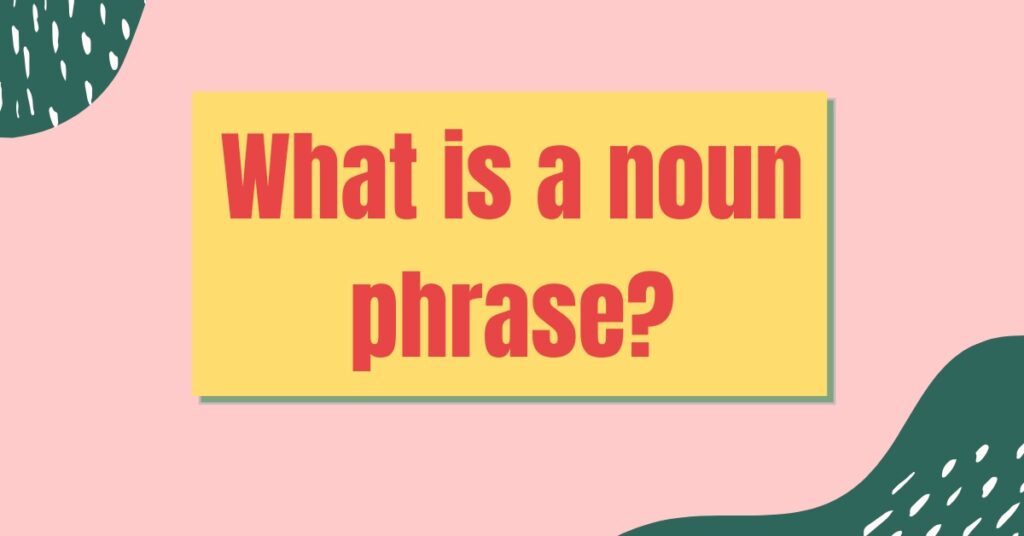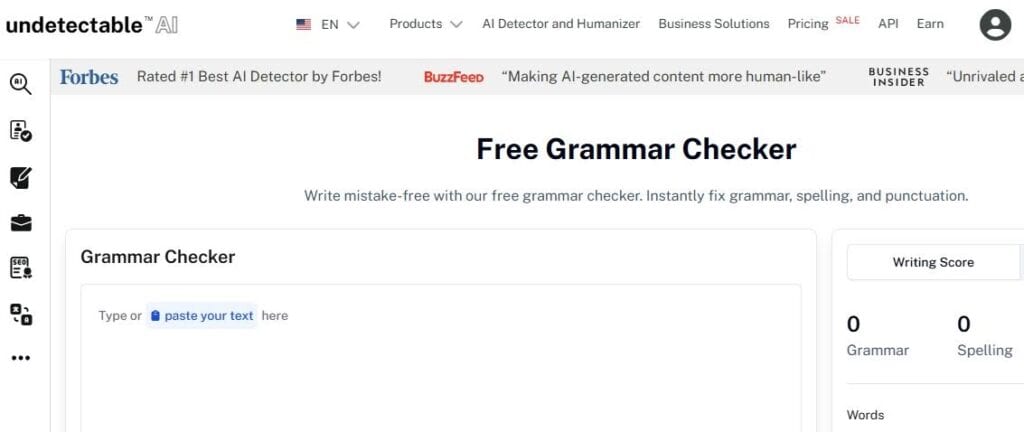You have probably encountered many varieties of phrases in your general speaking or writing in standard English.
This article will introduce you to the noun phrase; its meaning and definition, how to recognize a noun phrase and how to use it in a sentence, with practical examples to aid understanding.
Key Takeaways
- A noun phrase has adjectives, determiners, and/or prepositional phrases as part of it.
- Noun phrases are essential in sentence construction and can be used as a subject, object, or complement.
- Noun phrases consist of one word and one or more modifiers, adding more meaning to the noun itself.
- Simple nouns and noun phrases are not the same. While simple nouns stand alone, noun phrases consist of additional words providing specificity or detail to a word.
- There are occasions in which noun phrases are similar to gerund phrases, infinitive phrases, and adjective phrases; you can tell them apart by their functions as nouns.
Definition of a Noun Phrase

A noun phrase can simply be defined as a group of words that function as a noun in a sentence.
This means that they name or refer to he subject or object in a sentence. Let’s go more into the specifics of noun phrases.
Core Concept: A Noun + Modifiers
Nouns are used to refer to a person, place or thing. Noun phrases are very similar to nouns.


Never Worry About AI Detecting Your Texts Again. Undetectable AI Can Help You:
- Make your AI assisted writing appear human-like.
- Bypass all major AI detection tools with just one click.
- Use AI safely and confidently in school and work.
A noun phrase is a collection of words, typically a noun and a modifier (the modifier may be an adjective, adverb, or article) that acts the same as a noun.
A noun phrase can be a subject, object, subject complement, or object complement in a grammatical sense.
You should know that there are times when a noun won’t be found in a noun phrase. All that is needed is for the phrase to function as a noun in the sentence.
Remember that a sentence can contain any number of noun phrases.
Your grammatical skills improve if you know the various combinations that can help build a noun phrase.
To understand the different ways that a noun phrase can be created, check out what we’ve put together below;
A noun phrase can consist of:
- A noun, a conjunction, and another word
- One noun and one gerund
- A noun, an adjective, and an article
- A prepositional phrase, an article, and a noun
- Two nouns and a determiner
A noun phrase can also consist of an adverb, an adjective, a noun, and other numerous combinations.
How It Functions as a Subject, Object, or Complement
A noun phrase has a lot of purpose in grammar. It can function as either a subject, object, subject complement or object complement in a sentence.
When noun phrases are used in sentences, they add precision and depth by moving easily between the subject, object and complement places.
Subject
When a noun phrase is the subject, it provides information on the performance of an action; who or what is performing the action.
For instance
- “The bright red car sped past us.”
The noun phrase “The bright red car” provides more information about the performance of the action “sped”.
Object
As an object in the sentence, the noun phrase receives the verb’s action. Here is one of the many noun phrase examples you will be seeing throughout this article.
- “She bought a bouquet of fresh flowers.”
In this case, the noun phrase “a bouquet of fresh flowers” is the object of the sentence, that is, the receiver of the action being performed by the subject “she”.
Subject Complement
When used after a linking verb in a sentence, a noun phrase can also be used as a subject complement in a sentence.
This means that the noun phrase can change the subject’s name or give more information about it.
An example of this function is:
- “My dream is a beautiful cottage by the lake.”
The noun phrase “A beautiful cottage by the lake” tells us more about the subject “My dream”.
Nouns and Verbs
A noun phrase also provides additional information about a noun and can be used after verbs such as “actually”, “make”, etc.
Some examples are,
- They selected her to be the team leader.
- That was actually a good idea
The phrase “the team leader” adds to the object “her” by telling us what her new job is.
The noun phrase “actually a good idea” provides more context and describes the subject of the sentence “that”.
Difference Between a Noun and a Noun Phrase
Understanding the distinction between a noun and a noun phrase is very important in writing clear and grammatically sound sentences.
For example, nouns such as book, teacher, happiness, or city are a fundamental part of a sentence, which can be either the subject or object of the sentence, but do not provide any descriptive information.
On the other hand, a noun phrase consists of a noun (or pronoun) and all of the words that describe or modify it.
The modifiers could be determiners, adjectives, prepositional phrases, clauses or anything else that adds meaning. For example, the phrase
- “The old wooden bridge over the river”
The noun phrase includes other words, but “bridge” is the head noun, while the surrounding words provide extra details about the bridge.
A noun is one thing, but a noun phrase adds more structure and context and clarity to sentences.
Knowing how to differentiate a noun or noun phrase is important because it may dictate how you structure your sentences and punctuate phrases, to help you ensure correct grammar.
For those who struggle to identify noun phrases in sentences that seem complex, our Undetectable AI’s Ask AI is your best bet.
All you have to do is provide sentences and Ask AI will identify not only the noun phrases but also provide discrete pieces of the noun phrases, explaining which is the head noun, which are the modifiers and how the entire noun phrase operates within the sentence.

Parts of a Noun Phrase
A noun phrase is a phrase that has a head noun. The head noun is the word that is described or modified by the noun phrase.
However, a fully made noun phrase usually has some other associated parts that work together to give more information, make sense of the meaning, or discuss more about something.
These are usually the main parts of a noun phrase:
- Determiners: Determiners are words like a, an, the, this, those, or my that come before a name and show that it is specific, has a number, or belongs to someone. For Example:
- The big house
The word ‘The’ is a determiner and it tells us which house is being referred to.
- Modifiers: Adjectives or adjective phrases preceding a noun indicate the size, colour, origin or other characteristics of the noun. For Example;
- A beautiful wooden table.
The phrase “Beautiful wooden” is a modifier that tells us more about the table in the sentence.
- Head Noun: The head noun is the main noun that points out the subject or object of the sentence. For Example;
- An old wooden chair
The word “Chair” is the head noun because it is the main noun that points out what the sentence is talking about.
- Post Modifiers: Usually called qualifiers, these are words, phrases or clauses that come after a noun and modify the noun being referred to. They are often prepositional phrases, relative clauses or participial phrases. For Example;
- The car parked outside the building is mine.
The phrase “Outside the building” is a post modifier because it comes after the noun “car” and gives more information about where the car is parked.
Noun Phrase Structure
Determiner + Pre-Modifiers + Head word + Post-Modifiers is a common form for a word phrase to be put together.
Not every phrase is going to tick all the boxes when it comes to having each part of the form.
Sometimes you just get a bare-bones noun phrase, like “the book,” nothing fancy, just a determiner and a noun, nothing extra.
But if you want to make it more explanatory, you can put in a bunch of extra words like “the old, dusty book on the shelf near the window”.
The thing is, you have to arrange all the extra words in the sentence correctly, else you will end up with something that sounds off.
Like, “the beautiful wooden table” just rolls off the tongue, but “the wooden beautiful table”? Come on, nobody says that.
This is where our Undetectable AI’s AI Grammar Checker comes in handy.
It’ll catch you before you start stacking adjectives and mashing up phrases that don’t fit. It sorts out your modifiers and double-checks your punctuation, which, honestly, can be a lifesaver when you’re writing something important like essays or reports.
If you want your writing to be clear, our Grammar checker is your go-to.

Types of Noun Phrases
Here are some of the types of noun phrases;
Simple Noun Phrases
A simple noun phrase includes a head noun and maybe a determiner, without any additional modifying or qualifying descriptions. Simple noun phrases are simple and clear to identify in a sentence. Some examples of simple noun phrases are;
- The cat
- A teacher
- An Idea
In these examples, the sentences simply comprise a determiner (the, a, an) and a noun and do not include adjectives or prepositional phrases that provide descriptive details.
Complex and Prepositional Noun Phrases
A complex noun phrase consists of a head noun along with a number of modifiers that provide descriptive details about the subject of the sentence.
These modifiers include adjectives, prepositional phrases, participial phrases, and even relative clauses in some cases.
Some examples are;
- A beautifully adorned cake on the table.
- A book with a fading cover and damaged pages.
Both examples use adjectives and prepositional phrases to describe or qualify the head noun. These forms are mostly used in descriptive writing to convey vivid and particular imagery.
Appositive Phrases
An appositive noun phrase renames or clarifies the noun immediately preceding it.
An appositive noun phrase appears next to its noun and is often set off with commas when the appositive noun phrase provides non-essential information.
Some examples of appositive phrases include;
- These photos were taken by my friend, a good photographer.
- Mr Johnson, the CEO, revealed the new policy.
In the examples, “a good photographer” and “Mr. Johnson” are appositive noun phrases that provide further information about the nouns “my friend” and “The CEO” respectively.
Understanding these types of noun phrases helps you control sentence flow and fluency.
Noun Phrases vs Other Phrase Types

Noun phrases offer important sentence constructions, but they are easily confused with other kinds of phrases.
Understanding how to distinguish noun phrases from verb phrases, gerund phrases, and even adjectives and infinitive phrases will prepare you to recognize their function in a sentence easily.
Noun Phrase vs Verb Phrase
A noun phrase is built around a noun and can be used as a subject, object, or complement in a sentence. This tells us who or what the sentence is about. E.g.
- The bright red car
On the other hand, a verb phrase is a group of words built around a “verb”. Verb phrases basically show actions. E.g.
- “He is driving very fast”.
The key distinction to remember here is that noun phrases are built around nouns while verb phrases are built around verbs.
Noun Phrase vs Gerund Phrase
It is easy to mistake a gerund phrase for a noun phrase because it starts with a verb in the -ing form, but acts like a word in the sentence.
The main difference is that gerund phrases are made up of verbs that act like nouns. For example;
- It’s nice to swim in the ocean.
“Swim in the ocean” is the subject of this sentence, which means it works like a noun phrase.
That being said, it is a Gerund phrase because it starts with a verb form (swim). A noun phrase, on the other hand, will always be built around a noun but never a verb form.
Overlaps with Adjective and Infinitive Phrases
Although noun phrases, adjectives and infinitive phrases can seem similar on some occasions, they have different grammatical purposes.
After this section, you should have been able to answer the question of “why can the infinitive phrase be classified as a noun?”
An adjective phrase modifies a noun but cannot function as a subject or object on its own. For example,
- “The girl with the blue dress smiled,”
The phrase “with the blue dress” is an adjective phrase modifying “girl” within a larger noun phrase.
Infinitive phrases start with “to” + “verb”. They can be used in many ways in a sentence, including as noun phrases when they are used as subjects or objects.
Here’s an example of an indefinite phrase that can function as a noun:
- Our main goal is to finish the project on time.
“To finish the project on time” is an infinitive phrase that acts like a noun phrase as the subject. However, not all infinitive phrases work this way.
Some can also be used as adjectives or adverbs depending on the sentence.
Common Mistakes with Noun Phrases
Some common mistakes associated with noun phrases are;
Fragmented or Incomplete Phrases
There must be a head noun in every noun phrase. Leaving it out or shortening the phrase leaves thoughts unfinished.
“The woman with the” is an example of a broken phrase. Always check to see if the noun phrase is fully formed in your sentence.
Modifier Confusion or Redundancy
It can be hard to understand noun phrases if you put too many adjectives or modifiers in the wrong order in a sentence.
Repetition and Wordiness in Academic Writing
In academic writing, where there is a possibility of writers giving too much information, noun phrases that are too long are quite rampant.
The phrase “the results of the survey that the research team conducted” can be shortened to “the survey results that the research team conducted.” Shortened noun phrases are easier to read and understand.
Our Undetectable AI’s AI Humanizer can help make noun sentences sound more natural and smooth.
It makes hard-to-understand sentences easier to understand and improves your writing without changing the meaning, which is especially helpful in business or school papers.

Enhance your content’s authenticity—try the AI Detector and Humanizer now.
Final Thoughts
In writing, noun phrases are very important for sentences to be clear and provide adequate information.
You can use them as subjects, objects, or complements; they have a way of giving your work depth and accuracy.
However, it’s easy to make common mistakes like using too many words, unclear modifiers, and unfinished sentences, especially in formal or scholarly writing.
So be sure to do your due diligence, and you will be good to go.
With tools like Undetectable AI’s AI Humanizer, Grammar Checker, and Ask AI, you can refine your writing and spot issues before they weaken your message.
Finding a noun phrase in a sentence should be easy now that you know what one is.
Try Undetectable AI today to take your grammar and sentence clarity to the next level.
